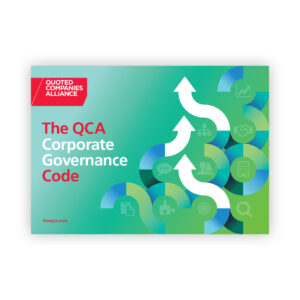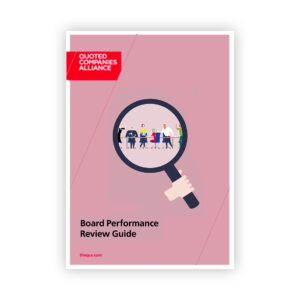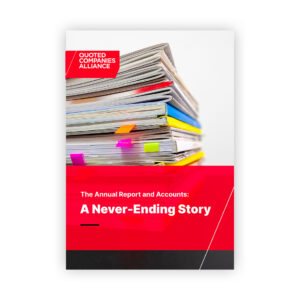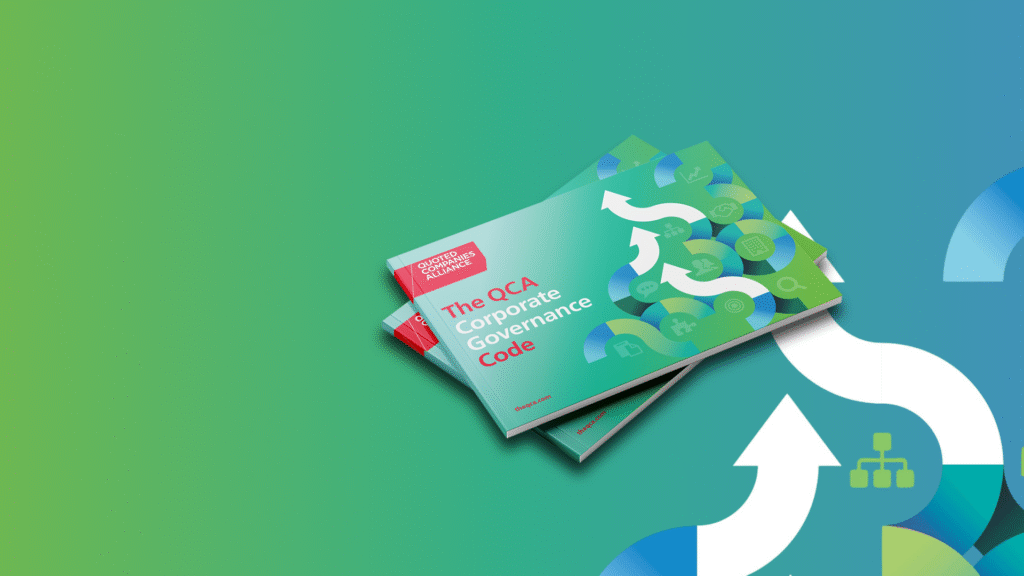About the QCA
We champion the UK’s community of 1000+ small and mid-sized publicly traded businesses and the firms that advise them.
QCA Corporate Governance Code
We are proud to develop and publish the number one governance code for UK growth companies that has improved the conversation between companies, their investors and wider stakeholders for more than a decade.
Learn moreCreating a positive dialogue with regulators, government and the media
The QCA seeks to inform policy in dialogue with regulators and government, showcase the latest thinking on leadership, investment, technology and governance through our events and research, and provide a forum to share good practice among our members, who are quoted on the Main Market, AIM and the Aquis Stock Exchange.
270+
Members
7
Expert Groups
30+
Years of Operation
OUR RESPONSIBILITY
Making life better for our members
The public equity markets can be the best place for companies to source the funds to grow, operate transparently and distribute wealth, fairly and widely.
Small and mid-sized publicly traded companies represent 91% of the quoted sector. They employ around 2.1m people and contribute more than £25bn in annual taxation.
We press for proportionate regulation that enables growth companies to fulfil their potential, while maintaining the necessary protections for investors.
Our Publications
Pick up a copy of our boardroom good practice guides, sentiment surveys and research reports – all provided free to QCA members.
Make your voice heard…
Get in touch to hear about the benefits we offer. Amplify your voice on key issues; connect with peers in your community; take advantage of discounts on a range of services; attend exclusive events.
Member Benefits
- Join our Expert Groups, policy work and lobbying activities
- Attend exclusive events, learn and network
- Receive FREE boardroom guides, newsletters and the QCA Code
- Take advantage of member discounts on technology and services


Our Upcoming Events
Our webinars, roundtables, dinners and lunches enable growing companies and their advisers to gain a greater understanding of the latest policy advances, good boardroom practice, swap ideas with peers – and forge new business connections.
Become a Member
Are you worried about the excessive cost and complexity of public company life, low levels of liquidity and a narrative in need of a reboot? Then join us today. We believe passionately that if quoted companies succeed in delivering vital jobs and prosperity, the UK succeeds.
Corporate
This membership option is for public companies quoted on the Main Market, AIM or the Aquis Stock Exchange, or companies preparing to join a market.
Adviser
This membership option is for firms that support quoted companies, including brokers, lawyers, corporate finance advisors, institutional investors, accountants, registrars, public relations firms, headhunters, consultants and other professional services.
What our members say
Don’t take our word for it. We are proud that our members are willing to speak up on our behalf too.
Updated Daily
Latest News & Insights
Frequently asked questions
Who is the QCA for?
For growing companies whose shares are publicly traded on any UK stock exchange, as well as the firms that support them: brokers, nominated advisers, accountants, lawyers, registrars, banks, corporate financiers, investors, technology providers, PR consultants, IR experts, headhunters. We reach across the whole City of London community and the companies they work for that are based all over the UK.
What do you do?
We champion the importance of the UK public markets and campaign on behalf of the companies that use them, particularly small-cap and mid-cap stocks.
That means identifying ways to reduce the cost and complexity of being public, pressing for proportionate regulation that works for companies of all sizes, driving up market liquidity – the volume of buyers and sellers – and improving the overall narrative for members.
We talk to government, regulators and the media, organise networking and knowledge sharing and publish a family of guides to encourage better boardroom behaviours, including our QCA Corporate Governance Code.
What sort of members do you have?
They are diverse, to say the least. Tiny companies seeking a commercial breakthrough for their cutting-edge technology. Well-established brands pushing into new export markets, or going on the acquisition trail.
They straddle sectors and geographies, from fintechs in Huddersfield and vehicle tracking experts in Mid-Wales to digital media producers in Glasgow, advanced engineers in Stoke-on-Trent and makers of security scanning devices in Abingdon. All have tapped shareholders via the public markets to fund-raise, acquire, incentivise, export, grow.
Their size varies too: from a market capitalisation of a few million pounds – to a few billion. All are welcome.
So it’s an organisation just for company CEOs?
Not at all. Some trade groups specify certain corporate roles for their membership but we operate more broadly. Sometimes Our primary contact could be is the chair, chief executive, finance director, company secretary or a non-executive director.
Among adviser members, it could be a sector specialist involved in one of our Expert Groups that inform our policy work or a business development lead.
A single QCA membership covers the whole organisation. Within reason, that means the whole senior team can take advantage of what we offer. We think that offers great value.
What’s so special about public companies?
They’ve been at the heart of UK business for decades. People still turn to the FTSE indices, which are baskets of public company shares, to judge the economic mood.
Public companies invest in their local economies, create well-paid jobs, operate to a high level of transparency, drive productivity and enable broad share ownership – including among their own workforce.
Today there are fewer UK public companies than for many years but we believe that trend can – and should – be reversed, with the right mix of regulatory reform, investor incentives and a better narrative.
And why do you favour small stocks over large?
Largely, large companies have the resources to look after themselves. We have always given voice to smaller companies who lack the resources to lobby at the highest level of government or regulation and might not get the media attention they deserve.
As an investment prospect, we also know that small-cap beats large-cap over the long term. The “Small Cap Effect” is well documented. Between 1954 to 2022, the UK small-cap sector outperformed UK large-cap by an average of 3.1% per annum. That means it produced returns almost seven times greater when compounded over the period.
However, given today’s challenges, we believe public companies of all sizes have more that unites than divides them. That’s why we welcome all public companies to join the QCA and take advantage of our network and our campaigning efforts.
What does “quoted” mean?
It’s an umbrella term for publicly traded – that is, a company whose shares can be bought and sold on a stock market. The stock quote is the latest price at which its shares are available – or, more accurately, it is made up of the “bid” price, which is the highest price at which someone is willing to pay for a single share, and the “ask” price, the lowest price at which someone is willing to sell a share.
“Quoted” is often used interchangeably with “listed” but there is a technical difference. Shares are “listed” on the Financial Conduct Authority’s Official List of securities (shares) which encapsulates the London Stock Exchange’s Main Market, including constituents of the FTSE 100 and FTSE 250 indices. Beyond that list are hundreds of growth companies whose shares trade elsewhere, for example on AIM or the Aquis Growth Market, which are referred to as “unlisted” but of course are still “quoted”.
The QCA represents companies whose shares are listed or unlisted. We also like to be “quoted”, regularly in the media talking on behalf of our members, and by others, who may be referencing our research reports or boardroom guides.
Why should I become a member?
To amplify your organisation’s voice on key issues, connect with peers in your community, learn from our webinars, workshops and boardroom guides, take advantage of discounts on a range of services and attend exclusive events.
If you succeed in your mission, don’t non-members feel the benefit anyway?
Yes, when our campaigns hit home with government and regulators. But to influence what we campaign on and how, you have to be member. The same goes for the vast majority of our events, whether that is lunching with fund managers, our flagship Annual Conference or regular roundtables and webinars with expert speakers and policymakers. It’s a club well worth joining.
And can you boost my business profitability too?
It is surprising how many QCA members have built valuable business relationships through the network. Sponsoring our events, webinars, podcasts, research and publications can help to build your brand, associate with key topics and generate leads.
We offer partnerships to members and non-members that work for a range of budgets to create enduring value. See our sponsorship brochure.
How are you run?
We are a small team, organised into three areas: policy and research; membership, operations, marketing, sponsorship, events and communications. Meet the team.
Who do you talk to in government and regulation?
We focus on the activities of a “Big Five” group of institutions: the Financial Conduct Authority, the Financial Reporting Council, HM Treasury, the Department for Business and Trade and their corresponding “shadow” functions within the Labour and Conservative Party.
We are fortunate to have good access to senior leaders as well as policy specialists, which has been built up over many years.
Don't you just represent AIM companies?
No. AIM will always be our heartland, but we are focused on growing our reach on the London Stock Exchange’s Main Market and also the Aquis Stock Exchange. We believe public companies of all sizes have more that unites than divides them. That’s why we welcome all public companies to join the QCA and take advantage of our network and our campaigning efforts.
Currently, we have more FTSE250 members than we have ever had, but recently some of the smallest companies on AIM have also joined us for the first time. All are welcome.
What have you achieved?
Over time, plenty. The founding fathers of the QCA were prime movers in the creation of the growth market AIM in 1995. Ever since then we have argued for proportionate policymaking to benefit London’s “long tail” of public companies.
Sometimes it’s easier to point out what didn’t happen because of our efforts, such as the government’s decision not to implement the European Union’s settlement regime, the Central Securities Depositories Regulation (CSDR), which would have had a devastating impact on liquidity.
Most importantly, we provide a constant voice speaking up for our markets and our members.
























